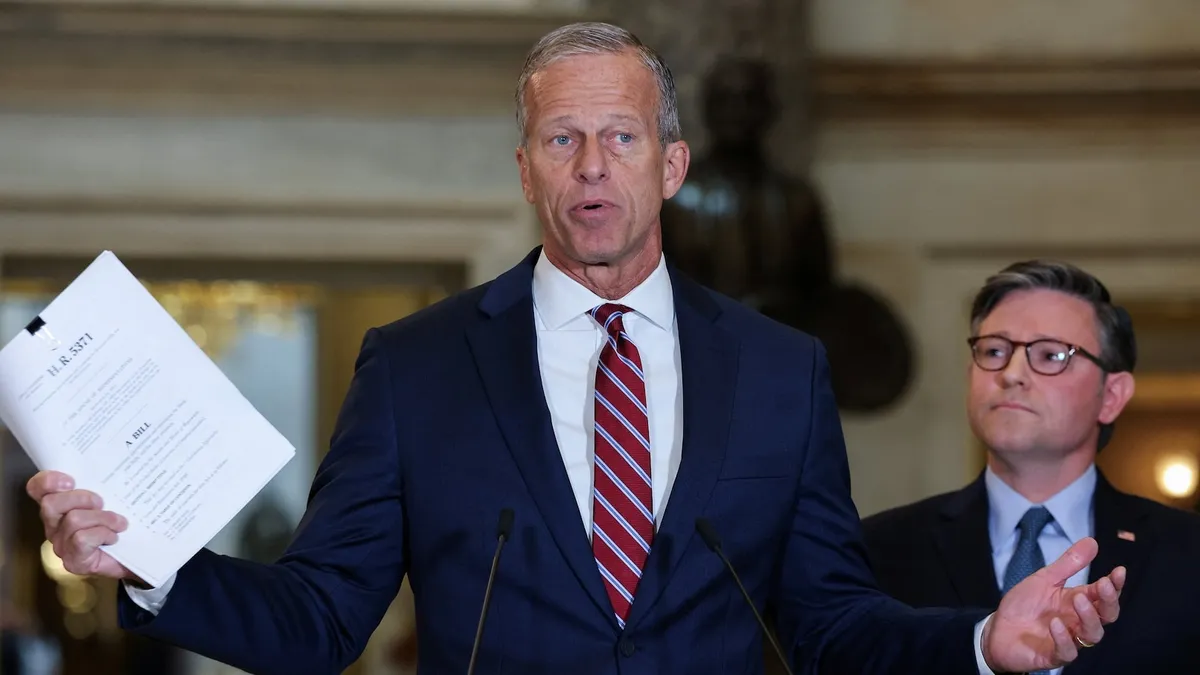
The ongoing government shutdown has now reached its third day as of Friday, with senators preparing for a crucial fourth vote on various funding bills. Unfortunately, with negotiations appearing to be at a standstill, it is likely that this shutdown could extend into the weekend, leaving many federal employees and services in limbo.
On the Senate floor, Senate Majority Leader John Thune expressed a firm stance against negotiating with Democrats regarding their demands to reopen the government. Just hours before another scheduled vote on the Republicans' clean seven-week funding bill, Thune insisted, “This shutdown needs to end sooner rather than later, and there's only one way out of it.” He urged Democrats to support the clean, nonpartisan continuing resolution that is currently on the table, stating, "All it takes is one roll call, vote, the government's back open."
In addition to the GOP-backed seven-week stopgap funding bill, the Senate is also set to vote on the Democrats' funding proposal that includes significant health care provisions. Thune suggested that discussions regarding health care could commence once they successfully pass the continuing resolution. However, with both Republican and Democratic leaders entrenched in their positions, it appears neither bill is likely to pass at this time. Both proposals have already failed in three previous votes since the shutdown commenced on Wednesday at 12:01 a.m.
Thune indicated that he does not anticipate any voting over the weekend, meaning the next opportunity to address these funding issues would not occur until Monday. If this is the case, the shutdown could potentially last at least six days longer. Meanwhile, Thune continues to seek support from Democrats to back the GOP funding bill, while Democratic leaders are scheduled to meet Friday afternoon to strategize their next moves.
During a press conference on Friday morning, Thune applied pressure on Democrats, highlighting the simplicity of the situation. “We have an opportunity to pick up a House-passed bill that if it passes the Senate, will be sent to the White House, the president will sign it and the government will reopen. It's that simple and that straightforward,” he stated, emphasizing that only a few more Democratic votes are needed. He expressed hope that Democrats would reconsider their stance over the weekend, stating, “Maybe some of these conversations start to result in something where we can start moving some votes and actually get this thing passed.”
House Speaker Mike Johnson also showed reluctance to engage in negotiations regarding Democrats' demands, which include extending the expanded Affordable Care Act subsidies set to expire at year-end. Johnson remarked, “Some of the issues that they're bringing to the table and they're demanding immediate easy answers for are not easy answers and they take a long time to deliberate. This is a deliberative body, and a very large one.” He emphasized that resolutions cannot be achieved simply by leaders convening in a room.
As the Senate grapples with the funding impasse, President Donald Trump has once again raised alarms about potential federal firings. The White House has warned that the repercussions of the shutdown could lead to thousands of federal workers losing their jobs. In a dramatic social media post, Trump shared an AI-generated video depicting Office of Management and Budget Director Russ Vought as the Grim Reaper, suggesting that mass layoffs could be imminent.
On the same day, Vought announced that $2.1 billion in funding for Chicago's Red Line Extension and the Red and Purple Modernization Project would be put on hold “to ensure funding is not flowing via race-based contracting.” This move follows previous actions by the Trump administration to suspend $18 billion in infrastructure funding for New York City and cancel $8 billion for energy projects in states that leaned Democratic in the last presidential election.
The shutdown has also disrupted economic reporting, as evidenced by the absence of the jobs report that was scheduled for release on Friday. This delay hinders the public's access to critical economic data and a comprehensive overview of the labor market. Currently, over 2,000 employees from the Bureau of Labor Statistics are furloughed, further exacerbating the effects of the ongoing government shutdown.
As the situation develops, the future of the government and its operations hangs in the balance, with both parties needing to find common ground to prevent further disruption.